HOME | ABOUT US | MEDIA KIT | CONTACT US | INQUIRE
HOME | ABOUT US | MEDIA KIT | CONTACT US | INQUIRE

Earlier this month, the U.S. Army dropped the unemployment bomb, announcing that by the end of 2017, it would accelerate plans to reduce the ranks of soldiers and officers by 40,000 and bring the active-duty head count to 450,000.
That’s the lowest level since before World War II, and a 21 percent decline from a post-9/11 high of 570,000. Interwoven through those statistics, though, are the personal stories of thousands of service members and officers—many of them with demonstrated leadership skills managing large, complex organizations with grueling deadlines and ever-tightening budgets.
While the dreams of full military retirement may be dashed for some, their separation from active duty presents not just a chance for them to make a fresh start, but opportunities for area companies to bolster their own leadership ranks. And yet, despite the emergence of a thriving group of organizations dedicated to helping veterans make that transition, this reduction, for many, could make a tough situation tougher.
“Anecdotally, I’ve seen a lot of senior leaders—more than last year, colonel and lieutenant colonel level, talented officers—who are still struggling” from previous draw-downs, said Mike Denning, director of graduate military programs at the University of Kansas. “They’re still looking for the right match, and I find that a little troublesome.”
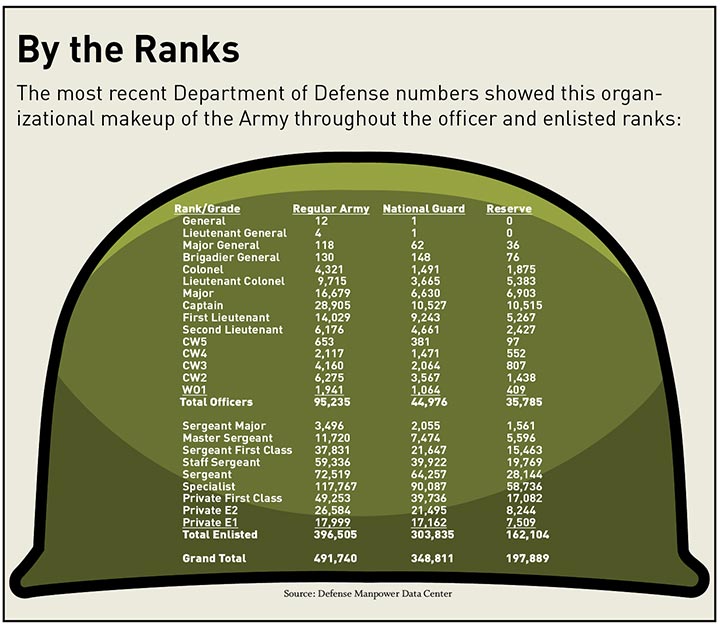
In the Kansas City region, Fort Leavenworth dodged most of that reduction, with 60 cuts announced, but Fort Riley will scale back by 615 positions and Fort Leonard Wood by 774, a regional total of 1,449. And those numbers don’t include civilian personnel who will also be trimmed.
Executives who deal with efforts to employ veterans say area companies looking to hire are in a particularly good situation, considering their proximity to those three installations. With the exception of cities on the East Coast and southeastern states, few other metro areas are bracketed by that kind of talent pool.
The big challenge now is: How to best tap into it?
For Denning, himself a retired Marine colonel, the problem is twofold: Not just getting highly qualified officers into the civilian work force, but getting the vastly larger numbers of lower-ranking soldiers on a path for career success outside the Army. He’s not encouraged by some of what he’s seen.
“A recent study by the University of Southern California stated that of those who are leaving active duty for employment, only 20 percent have a job in hand—that’s problematic,” he said. “Then from our perspective, of the total people getting out, only 25 percent are choosing to go into higher education.” All of them have access to benefits from the updated GI Bill, Denning said, so “I’m not sure why that is,” he said. “I’ve got some suspicions whether they think they’re ready to jump into higher education, and that’s something we’re looking into at KU—how to facilitate that transition.”
Brett Rosene, transition services manager at Fort Leavenworth, has been tackling this issue head-on since assuming those duties in 2012. In that span, he’s seen a lot of soldiers and officers coming to grips with the rea-lity that their careers could soon be over.
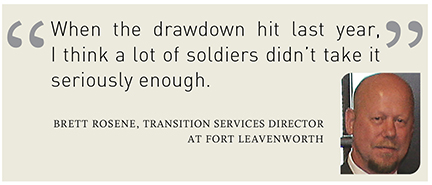
“A lot of people knew it was being announced, but these were good officers who had good careers, successful careers,” he said “But because their specific job specialty was in areas that were a little over-strength, the Army had to cut some. That’s what caught people by surprise.
“When the drawdown hit last year, I think a lot of soldiers didn’t take it seriously enough,” says Rosene, whose office fielded more than 650 requests for assistance last year. “They were notified that they might be considered for separation, but a lot didn’t think it would actually happen—until it did.”
At that point, he saw an influx of people in his program who were selected for separation, but “instead of being prepared by a year, they now had four to six months,” he said. “What we see now is that people are taking this more seriously, coming in whether they think they’ll be selected or not, and starting to prepare themselves early on, just in case they should be separated.”
He also said they’re networking earlier, and getting an earlier jump on research into civilian job markets in various communities. Both of those points, say transition experts, are absolutely critical to making a smooth move into the regular work force.
And more than just smooth, making sure that the next fit is the right one.
“Many soldiers default to government civil service in various federal agencies,” said Bob Ulin, CEO of the Center for Transitional Leadership in Leavenworth, which provides coaching and mentoring for mid- to senior-grade personnel that have the best track records of success. Others, Ulin said, have prepared themselves for private-sector jobs, and a few have chosen to become entrepreneurs.
“But this process is not a one-size-fits-all strategy,” Ulin noted. “There’s a big difference between finding work for junior enlisted soldiers, mid-grade officers, senior NCOs and general officers.”
Even at the rank of private, say transition professionals, the skill sets of a soldier present a solid base for employee development: They understand the value of teamwork as well as the need to be self-starters and complete tasks with minimal supervision. They know how to operate in complex environments, they are disciplined and respect authority, and they understand how their roles fit into the broader mission of an organization.
Given that foundation, additional experience in logistics, mechanics, HR duties, and other support functions is icing on the hiring cake.
At senior leadership levels, it’s important for corporate hiring managers to truly understand the kinds of responsibilities that are matters of daily life in the military, in particular those duties attached to the leadership ranks, transition professionals say.
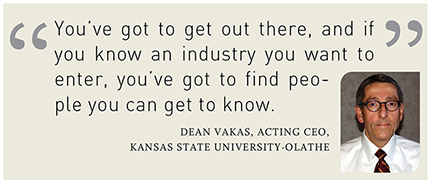
Think of a CEO, answering to a Washington-based board of directors, who manages a work force of 250 to 1,000, often a captain or major); from 800 to 1,200, as with a colonel or lieutenant colonel, or with the thousands of employees who might be led by a brigadier general. In each lead role, the commander must have a complete grasp of the costs and logistics involved in moving, feeding, arming and training those units, all within the framework of a larger organizational mission.
In the civilian work force, someone with that skill set could readily make the leap from one corporate setting to another, or even from one business sector to another. The question of why that isn’t a slam dunk for veterans is . . . why?
Making the move to civilian business is a particular challenge for the military, whose experience in service has been framed around the concept of teamwork and putting their respective units, not themselves, first.
“For transitioning members of the military, it is important to consider who you think you are, what your potential employees think you are and who you really are,” said Dean Vakas, acting CEO of Kansas State University’s Olathe campus. “Sometimes you need a professional’s advice in answering these three questions.” Answering those questions correctly, he said, provides a realistic assessment of one’s employability, but “it’s also important to look at the type of business,” he said, and to “realistically examine what it takes to be hired and how to best present yourself.”
Virtually anyone working in this space says the most important step that veterans can take is to understand the power of networking, and make it work for you.
“Working with an accomplished coach or mentor with military and civilian executive experience is the best approach,” said Ulin. “It’s really important for soldiers to start networking and exploring opportunities about 18 months before leaving the service. Some may require additional education and training, others need time to explore their options. Those who wish to start their own business have a lot of work to do to be successful.”
Vakas concurred. “You’ve got to get out there, and if you know the industry you want to enter, you’ve got to find people you can get to know. I tell soldiers all the time, go to museum openings, business openings—people who attend those are often the ones who hire for their companies.” That way, he said, when a resume crosses their desk with a name they might recognize, one foot is solidly in the doorway for that all-important interview.
From Rosene’s perspective, veterans separating from duty in this region have been issued something akin to a winning employment-lottery ticket.
“We are very fortunate here,” he said. “With the military transition in the Kansas City area, a person is not going to transition and not get a job unless that is their intention. We have enough employers and enough open jobs in the area where everybody will find something. It may not be their dream job, it may just be something to get by, but anybody who separates in the Kansas City area will probably have a paycheck.”
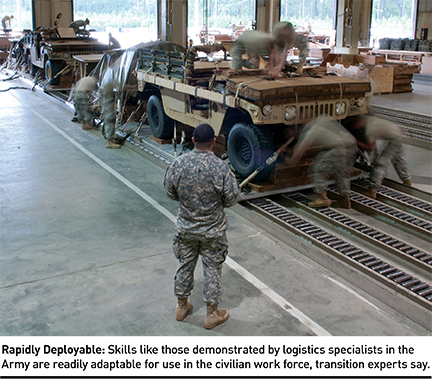
For many who had planned on serving out their military careers, age could become a liability, but needs to be presented to hiring managers as a huge asset, given the experiences and skills accrued.
“Age is always an issue, but in varying degrees, depending on what job or career field you plan to pursue,” Vakas said. “Age can definitely be a discriminator, but it can work for you or against you, and this is a key point for transitioning military.”
The workplace in civilian society is distinctly different from a regimented military hierarchy, he said, so veterans “must be flexible and mentally agile in understanding and coping with the needs of various business sectors and the discriminators that can make you imminently employable or unemployable.”
Ulin cited figures from the Bureau of Labor Statistics showing that in 2012, roughly 477,000 veterans were unemployed. “Of that number,” he said, “60 percent were 45 years of age or older. This seems to be the age cohort that has the most difficulty finding a job.”
That notwithstanding, said Vakas, “it really is important to seek trusted advice from those that have successfully transitioned in order to best prepare yourself for a journey that can be challenging and humbling.” For many, though, in particular the servicemen at the lower ranks, part of the challenge lies in successful self-promotion, coming from an environment where selflessness and devotion to unit are paramount.
“It’s something that’s not natural, that’s 100 percent right,” said Drew Meyerowich, an 28-year Army veteran who now is COO at Liberty-based Holland 1916. But people, he said, “know when you’re being self-serving vs. just trying to communicate with them. I don’t know what the answer is, but it’s very delicate how you deal with that.”
At the post-secondary level, state-funded institutions including the University of Kansas, K-State, Missouri and UMKC all have special offices devoted to assisting veterans interested in going to, or back to, college, including guidelines on class credits immediately available for particular skill sets.
Among private colleges, virtually all have a veterans-assistance office, and Park University’s ties to the military are award-winning, having spawned operations in more than 40 satellite campuses around the nation, and globally on-line.
As for companies looking to fill immediate openings in the two-state region, a number have stepped up with highly focused efforts to tap into just this candidate pool. Ulin cited UMB Bank and Koch Industries, which tho-ugh based in Wichita has operations in this area. Sprint is another key player, Vakas said, and not just for hiring, but for helping veterans find success.
“Sprint really targets military markets and knows how to reach out,” Vakas said. “They understand that some of these guys don’t know when or if they’ll get out, but the company helps them all the same: resume training, classes, one-on-one briefings.”
He also praised BNSF Railway and even the import car maker Audi, while others point to national companies like Starbuck’s and Home Depot, and closer to home, J.E. Dunn Construction, as leaders in the effort to put veterans on the payroll. Ulin’s Center for Transitional Leadership is frequently cited as a source for guiding leadership-level candidates.
Each of those companies, Vakas says, knows something that competitors would be remiss to ignore.
“Every good company that takes the time to fully consider the personal and professional qualities of veterans, finds a way to integrate them into their work force,” he said. “Employing smart veterans who are mature, meticulous, disciplined, balanced and who understand what success means—both organizationally and personally—are the surest path to a sustained, profitable business.”
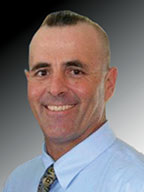
He counts himself among the luckier ones: Not everyone who has left the military in the drawdown era was nudged out. But Drew Meyerowich was able to leave the Army last November on his own terms after wrapping up his final duties as director of the Command and General Staff schools at Fort Leavenworth.
Before the New Year’s Eve countdown started, Meyerowich had deftly stepped from a leadership position in the military and into his new career: He’s the chief operating officer for Liberty-based Holland 1916, parent of four Northland companies that produce RFID inventory-management systems, electronic components and metal nameplates.
While commanding a brigade of 9,000 U.S. soldiers in Iraq from 2010-12, he began to think of the next chapter. “As much as I love the Army, physically and mentally, I was ready for a change after 28 years,” he said. “I wanted to get out and pursue life in the business world.”
During his stint at Fort Leavenworth, this Florida native and his wife “fell in love with the Kansas City area,” he said. After the decades on the move, including his time in Iraq and a Silver Star-winning role in the Battle of Mogadishu, this would be home. The first step to making that happen was ingrained in decades of leadership: Start with a strategic plan.
So he began researching—publications like Ingram’s Book of Leads & Lists are a huge asset, he said—and he started meeting people behind the companies that intrigued him—lots of people. He worked trade shows and hiring fares, attended organizational events, even made cold calls to ask if someone could provide a few minutes of guidance over a cup of coffee.
“Hearing the challenges in their companies gave me the opportunity to articulate how I would solve those,” Meyerowich said. “I don’t think it’s that much different from military leadership: You’re still dealing with people, the financial side of things, and keeping everything in balance.”
Had someone told him even a year ago that he’d be knee-deep in operations at a manufacturing company, “I would have said, ‘I haven’t even talked to anyone in the manufacturing world; how could I possibly work in it?’
But that’s the true power of networking—people start connecting dots between different companies.”There’s no question, you need a serious dollop of self-confidence to execute such a move.
“I’m not a big fan of all these services out there saying ‘the transition from the military is difficult and you need my help because the business world doesn’t understand the transferable skills you have.’ If people don’t understand, it’s your responsibility to communicate it,” Meyerowich said. “That takes effort, and it takes time.” And it can’t be about finding a job: “It’s about meeting people who can help each other,” he said.
Kansas City’s reputation as a community with business leaders who are exceptionally willing to provide mentoring guidance is a big plus, he said. “Somebody can say no, but of the 100-plus times I asked, I could count on one hand the number who said they had no time for me.” Invariably, Meyerowich said such meetings are “the best transition assistance out there, and people haven’t tapped into the business community here the way they should. It’s on us to make this work.”
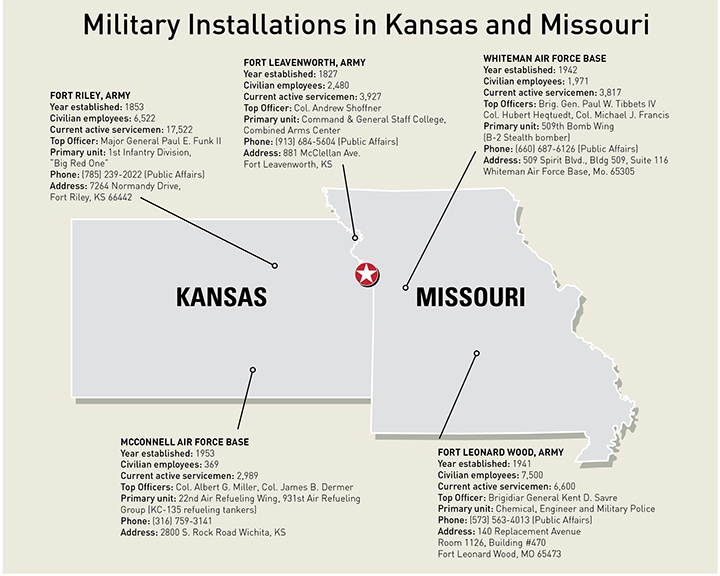
Division of Behavioral Health Alcohol & Drug Abuse
National Guard Initiative
1706 E. Elm St., P.O. Box 687, Jefferson City, MO 65102
Phone: 573.751.4942; www.dmh.mo.gov/ada
Mark Stringer, Director of Division of Behavioral Health
Mission: Works with the MO National Guard to offer substance abuse consultation, evaluations, assessments, and treatment to MO national guard soldiers at no cost.
Employer Support of the Guard and Reserve–Jefferson City
2302 Militia Dr., Jefferson City, MO 65101
Phone: 573.638.9500 x37730; www.esgr.org
Steven Brothers, Program Support Specialist
Mission: Develops and promotes a culture in which all American employers support and value military service of their employees.
Employer Support of the Guard and Reserve–Kansas City
7600 Ozark Road, Kansas City, MO 64129
Phone: 816.988.7960; www.esgr.org
James Carver, Administrative Support Technician
Mission: Develops and promotes a culture in which all American employers support and value military service of their employees.
Employer Support of the Guard and Reserve–St. Louis
16987 Riverdale Dr., Chesterfield, MO 63005
Phone: 636.778.3449; www.esgr.org
Brandy Scheer, Program Support Technician
Mission: Develops and promotes a culture in which all American employers support and value military service of their employees.
Employer Support of the Guard and Reserve–Topeka
2800 S.W. Topeka Blvd., Topeka, KS 66622
Phone: 785.274.1559; www.esgr.mil
Paul Swanson, Program Support Technician
Mission: Develops and promotes a culture in which all American employers support and value military service of their employees.
Employer Support of the Guard and Reserve–Wichita
2808 N New York St., Wichita, KS 67219
Phone: 800.892.7266 x1372; www.esgr.mil
Becky Richardson, Administrative Support Technician
Mission: Develops and promotes a culture in which all American employers support and value military service of their employees.
HERO (Housing, Employment, Recovery, Opportunities)
800 North Tucker Blvd., St. Louis, MO 63101
Phone: 314.802.0700; www.stpatrickcenter.org
Laurie Phillips, CEO
Mission: Collaboration with the St. Patrick Center which provides transitional housing for homeless veterans with mental issues and/or substance abuse issues.
John J. Pershing VA Medical Center
1500 N. Westwood Blvd., Poplar Bluff, MO 63901
Phone: 573.686.4151; www.poplarbluff.va.gov
Marj Hedstrom, Medical Center Director
Mission: Provides primary care to veterans in 29 counties.
Kansas City VA Medical Center
4801 Linwood Blvd., Kansas City, MO 64128
Phone: 816.861.4700; www.kansascity.va.gov
Kevin Q. Inkley, Medical Center Director (Interim)
Mission: Provides healthcare services to the men and women who have served in the military.
Kansas Commission on Veteran Affairs
700 S.W. Jackson, Ste. 1004, Topeka, KS 66603
Phone: 785.296.3976; www.kcva.ks.gov
Gregg Burden, Executive Director
Mission: Helps veterans and their families claim benefits through programs and services.
Kansas Soldiers Home
101 Pershing, Fort Dodge, KS 67843
Phone: 620.227.2121; www.kcva.ks.gov/veterans-homes
Scott Hilmes, Superintendent
Mission: Provides care and shelter for disabled soldiers.
Kansas Veterans Home
1220 World War II Memorial Dr., Winfield, KS 67156
Phone: 620.221.9479; www.kcva.ks.gov/veterans-homes
Steve Dunkin, Superintendent
Mission: Provides care and shelter for disabled veterans.
Kansas Workforce Center
9221 Quivira Rd., Overland Park, KS 66215
Phone: 913.577.5900; www.workforcepartnership.com
Theo Coney, State Veterans Service Manager
Mission: Helps to provide jobs and resources, primarily serves Johnson, Wyandotte and Leavenworth counties.
National Guard Education Services Office
2800 S.W. Topeka Blvd., Topeka, KS 66611
Phone: 785.274.1081; www.kansastag.gov
Tom Warth, Education Services Officer
Mission: Provides education services and scholarship/loan information to all members of the Kansas National Guard.
Kansas Small Business Development Center
214 SW 6th St., Ste. 301, Topeka, KS 66603
Phone: 785.296.6514; www.kansassbdc.net
Greg Panichello, State Director
Local Veterans Employment Representatives & Disabled Veterans Outreach Program
421 E. Dunklin, Jefferson City, MO 65101
Phone: 573.526.9762; www.jobs.mo.gov
Shams Shughtai, Veterans Service Manager
Mission: Help disabled veterans find jobs, operate under the Division of Workforce, a part of the career center system.
Missouri State Veterans Home–Cameron
1111 Euclid, Cameron, MO 64429
Phone: 816.632.6010; www.mvc.dps.gov/homes
Brad Haggard, Administrator
Mission: Provides care and shelter for disabled veterans.
Missouri State Veterans Home–Cape Girardeau
2400 Veterans Memorial Dr., Cape Girardeau, MO 63701
Phone: 573.290.5870; www.mvc.dps.gov/homes
Viviane Rains, Administrator
Mission: Provides care and shelter for disabled veterans.
Missouri State Veterans Home–Mexico
1 Veterans Drive, Mexico, MO 65265
Phone: 573.581.1088; www.mvc.dps.gov/homes
Branda Ezell, Administrator
Mission: Provides care and shelter for disabled veterans.
Missouri State Veterans Home–Mt. Vernon
1600 S. Hickory, Mt. Vernon, MO 65712
Phone: 417.466.7103; www.mvc.dps.gov/homes
James Dennis, Administrator
Mission: Provides care and shelter for disabled veterans.
Missouri State Veterans Home–St. James
620 N. Jefferson, St. James, MO 65559
Phone: 573.265.3271; www.mvc.dps.gov/homes
Cathy Haynes, Administrator
Mission: Provides care and shelter for disabled veterans.
Missouri State Veterans Home–St. Louis
10600 Lewis & Clark Blvd., St. Louis, MO 63136
Phone: 314.340.6389; www.mvc.dps.gov/homes
Mark Fontana, Administrator
Mission: Provides care and shelter for disabled veterans.
Missouri State Veterans Home–Warrensburg
1300 Veterans Rd., Warrensburg, MO 64093
Phone: 660.543.5064; www.mvc.dps.gov/homes
Eric Endsley, Administrator
Mission: Provides care and shelter for disabled veterans
Missouri Universal Service Fund
PO Box 752, Jefferson City, MO 65102
Phone: 573.634.1319; www.missouriusf.com
Mission: Helps disabled Missourians with phone service.
Missouri Veterans Commission
205 Jefferson St., 12th Fl., Jefferson City, MO 65102
Phone: 573.751.3779; www.mvc.dps.gov
Larry D. Kay, Executive Director
Mission: Provides info to veterans and their dependents to help them access available benefits through state and federal government.
Missouri Veterans Education and Training
205 Jefferson Street, Jefferson City, MO 65101
Phone: 573.751.3487; www.dese.mo.gov/divcareered/veterans_ed_index.htm
Chad Schatz, Director
Mission: Oversees a variety of Veterans Education programs.
Operation Recognition
205 Jefferson St., Jefferson City, MO 65102
Phone: 573.526.3487; www.mvc.dps.mo.gov
Chad Schatz, Director
Mission: Provides honorary high school diplomas for Veterans and civilian POWs who left high school before graduation to serve.
Robert J. Dole VA Medical Center
5500 East Kellogg Ave., Wichita, KS 67218
Phone: 316.685.2221; www.wichita.va.gov
Francis Vazquez, Medical Center Director
Mission: Primary/ secondary care site; six outpatient clinics.
Show-Me Heroes (KC Career Center)
1740 Paseo, Kansas City, MO 64108
Phone: 816.471.2330; www.showmeheroes.mo.gov
Mission: Addresses needs and employment to keep a military family from falling into poverty while the income earner is on duty.
St. Louis Regional Benefit Office
400 South 18th Street, St. Louis, MO 63103
Phone: 800.827.1000
Stanton S. Nickens, Director (acting)
Troops to Teachers, Kansas
P.O. Box 480, Jefferson City, MO 65102
Phone: 573.751.1250; www.ProudToServeAgain.com
Chad Schatz, Director
Mission: Seeks to place retiring military personnel in second careers as public school teachers.
Troops to Teachers, Missouri
P.O. Box 480, Jefferson City, MO 65102
Phone: 573.751.1250; www.ProudToServeAgain.com
Chad Schatz, Director
Mission: Seeks to place retiring military personnel in second careers as public school teachers.
VA Central Area Office
1222 Spruce St., Ste. 3.309, St. Louis, MO 63103
Phone: 800.827.1000; www.va.gov
VA Eastern KS Healthcare System, Colmery O’Neil VA Medical Center
2200 S.W. Gage Blvd., Topeka, KS 66622
Phone: 785.350.3111; www.topeka.va.gov
A. Rudy Klopfer, Director
Mission: Primary care consisting of 39 counties in Kansas & Missouri.
VA Eastern KS Healthcare System, Dwight D. Eisenhower VA Medical Center
4101 4th Street Trafficway, Leavenworth, KS 66048
Phone: 913.682.2000; www.topeka.va.gov
A. Rudy Klopfer, Director
Mission: Primary care consisting of 39 counties in Kansas & Missouri.
VA St. Louis Healthcare System, Jefferson Barracks Division
1 Jefferson Barracks Dr., St. Louis, MO 63125
Phone: 314.652.4100; www.stlouis.va.gov
Patricia Ten Haaf, Director (acting)
Mission: A two-division facility that serves veterans and their families in east central Missouri and southwestern Illinois.
VA St. Louis Healthcare System, John Cochran Division
915 North Grand Blvd., St. Louis, MO 63106
Phone: 314.652.4100; www.stlouis.va.gov
Patricia Ten Haaf, Director (acting)
Mission: Two division facility that serves veterans and their families in east central Missouri and southwestern Illinois.
Veterans Business Resource Center
315 Lemay Ferry Rd., #114, St. Louis, MO 63125
Phone: 314.531.8387; www.vetbiz.com
Deracella Craven, Executive Director
Mission: Assists veterans by providing counseling, mentoring, resources, and education to help launch or grow a business.
Veterans Employment and Training Services
421 E. Dunklin Street, Jefferson City, MO 65101
Phone: 573.751.3921; www.dol.gov/vets/
Mission: Provides veterans with resources and services to succeed by maximizing their employment opportunities.
Veterans of Foreign Wars HQ
406 West 34th St., Kansas City, MO 64111
Phone: 816.756.3390; www.vfw.org
John W. Stroud, Commander-In-Chief
Mission: Provides services and resources to help improve conditions for veterans.
Veterans Travel Service
406 W. 34th St., Ste. 106, Kansas City, MO 64111
Phone: 816.531.5850; www.vtstvl.com
Valerie Cooper, Owner
Mission: Helps veterans find travel discounts and plans worldwide trips for U.S. veterans.
Veterans United Home Loans
1400 Veterans United Drive, Columbia, MO 65203
Phone: 800.884.5560; www.veteransunited.com
Brock Bukowsky/Brant Bukowsky, Co-Founders
Mission: Provides mortgage-lending services to help veterans buy homes.
VFW Credit Union
406 West 34th St., Ste. 818, Kansas City, MO 64111
Phone: 816.968.2790; www.creditunionaccess.com
John W. Stroud, Commander-In-Chief
Mission: Offers financial assistance to veterans.
Wichita Regional Benefit Office
5500 East Kellogg Ave., Wichita, KS 67218
Phone: 800.827.1000; www.benefits.va.gov/wichita
Stacey Bonnett, Veterans Service Center Manager
Mission: Administers benefits and services to veterans, servicemen, and their families.